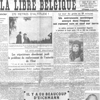National Content: Belgium
A globe tour in 89 minutes. A Soviet astronaut sent to the space and brought back safe and sound on Earth. The cockpit hosting Captain Gargarin flew at an altitude of 175 - 302 km.
| Source | "La Libre Belgique", n°103, the 13th of April 1961, pages 1, 3, 4. |
| Event referred to | 12th of April 1961: Yuri Gagarin : the first man in space |
| Technological characteristics | Type of file: Image Extension : pdf Characteristics Dimension of the file: 1980 Ko Availability proposed: pdf document with zoom options |
| Description of the source | Kind of source: Newspaper article Origin of the source: Archive of the University of Liege (Belgium) Language: French Copyright issues: reproduction and pedagogical exploitation authorized in the framework of the MHM project |
| Contextualisation of the source | « La Libre Belgique » is an important French-speaking newspaper. Started in 1884 under the title «Le Patriote», it become «La Libre Belgique» just after World War II. This daily paper of Catholic conservative trend is edited in Brussels. It sets itself against the influence of the syndicates in the politic life and it defends a very liberal economic policy. It is especially read in the great urban centres as well as in the small rural township, by all social classes. In 1967, 170,000 copies were daily edited (J. GOL, Le monde de la presse en Belgique, édition du Centre de Recherche et d’Information socio-politiques – CRISP- 1970) |
| Interpretation of the source | “La Libre Belgique” comments on the event on 3 pages ( the first page and the pages 3 and 4). The event takes 1/5 of the first page. On the first page, an article speaks about the expectation before the official notification of the flight whereas the development of this flight is described in another text. The 2/3 of the page 3 are dedicated to the flight of Gagarin. On this page a biography of Gagarin, a congratulation message of Khroutchev to Gagarin as well as a Russian appeal for peace are listed. The 2/3 of the page 4 are dedicated to the event. On this page, an article speaks about the luckless consequences for peace and arms race that Gagarin’s flight could bring. Still on the page 4, we can read the reaction of Kennedy President after the Gagarin’s space flight. We can notice that “La Libre Belgique” criticizes several times the Soviet system and its lack of clearness. |
| Original Contents | En marge des étapes soviétiques de la conquête de l’espace. Le mercredi 12 avril 1961 on a appris que le premier homme de l’espace, un Russe, avait réalisé avec un retentissant succès l’expérience de "l’homme-satellite". C’est un exploit scientifique extraordinaire. Toutefois, du point de vue militaire (ne peut-on pas en parler puisqu’il y a des tensions politiques et des conflits armés présentement sur le globe), n’est-ce pas une menace susceptible d’être grave ? Supposons que deux pays adverses en arrivent à utiliser leurs armes les plus puissantes et qu’ils tentent de se détruire mutuellement par l’emploi de fusées intercontinentales, d’avions stratégiques larguant des projectiles infernaux etc. Les satellites lourds avec homme à bord ne constitueraient-ils pas des armes de représailles fort efficaces ? Imaginons dix engins de cette sorte avec chacun dix bombes à bord : ils sont "en l’air" et peuvent frapper où et quand bon leur semble... On a entendu des militaires dire : le premier des adversaires possédant des satellites armés en rotation autour de la Terre sera le plus fort... Sont-ce là des assertions non fondées ? Nous ne voulons le croire pour le calme et le bonheur de l’humanité ! Laud. La Libre Belgique, 13 avril 1961, p.4. |
| Original Contents (English Translation) |


